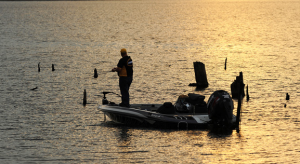Post
Bass Fishing Cold Fronts, Warming, & Spring
Bass (Small & Largemouth), Freshwater Fishing Articles, Freshwater Fishing Tips, Tackle Tips & How To's theangler PM

At this very moment, the 48-year old Arizona inhabitant is concentrating on every cast as he fishes his sixth Bassmaster Classic, which is being held on Alabama’s 69,000-plus-acre impoundment known as Lake Guntersville.
The weather early on during pre-fishing was anything but stable, as last week’s arctic plunge with associated snow and ice did not spare the Lake Guntersville area. Plus, the 70-plus-mile-long body of water is large enough that competitors can expect to experience slightly different climate conditions in different locations. This got us thinking… What’s Murray’s take on cold fronts, warming trends and producing a bass bite in early spring?
Question: John, what’s the biggest challenge anglers are faced with during their particular spring season, no matter where they cast?
Murray: Water temperature, and how quickly it can change. For example, the first day of pre-fishing for the Classic the lake averaged 36 degrees Fahrenheit, but by the last day it had warmed to 53. And there’s a cold front predicted, so I’m sure it will cool off again.
Question: So the bass moved shallow and the catching improved as the mercury rose?

Question: Where should bass anglers start their search during this timeframe?
Murray: They need to pay attention to protected areas away from the main lake basin like bays or areas that narrow, say, where a bridge crosses. It’s these sheltered areas where the water will be quickest to warm.
Question: Are all protected areas created equal?
Murray: Not even close. The ones that have new vegetation sprouting out of the lake’s floor will have fish in them, while the areas that don’t will not. For instance: two bays, same size, same depth, same everything but weed growth – the one with vegetation will win out every time. And better yet are the newly-forming weed beds adjacent to deep water. And it doesn’t have to be 100 feet deep, but water starting at 10 feet or more. It’s off these breaks the fish will go when the water gets cold again.
Question: Like most lakes and reservoirs, Guntersville has a variety of forage, from shad, young-of-the-year fishes and crustaceans – what will you be picking out of your Plano boxes to fool fish at the Classic?
Air temperatures in the Lake Guntersville area are supposed to stabilize in the sixties during tournament days, so competitors can expect water temps to be on the rise all weekend – depending, of course, on where they are fishing – and that will be key. As Murray says, “the bass just don’t swim up on the bank because the air temperatures rise a few degrees,” so expect many Classic competitors to be looking for those areas that are just a few degrees warmer than the rest of the lake.
Rapidly changing weather and fluctuating water temperatures draw curses from many weekend bass anglers. As a matter of fact, such conditions are widely held as one of the most challenging aspects of bass fishing. So, it will certainly be exciting and educational watching the best bass fishermen in the world doing battle with such loathed conditions at this year’s Bassmaster Classic. Only time will tell who will crack the code and deliver payloads of bass at weigh-in time. Until then, we’ll all have plenty to learn by watching.
